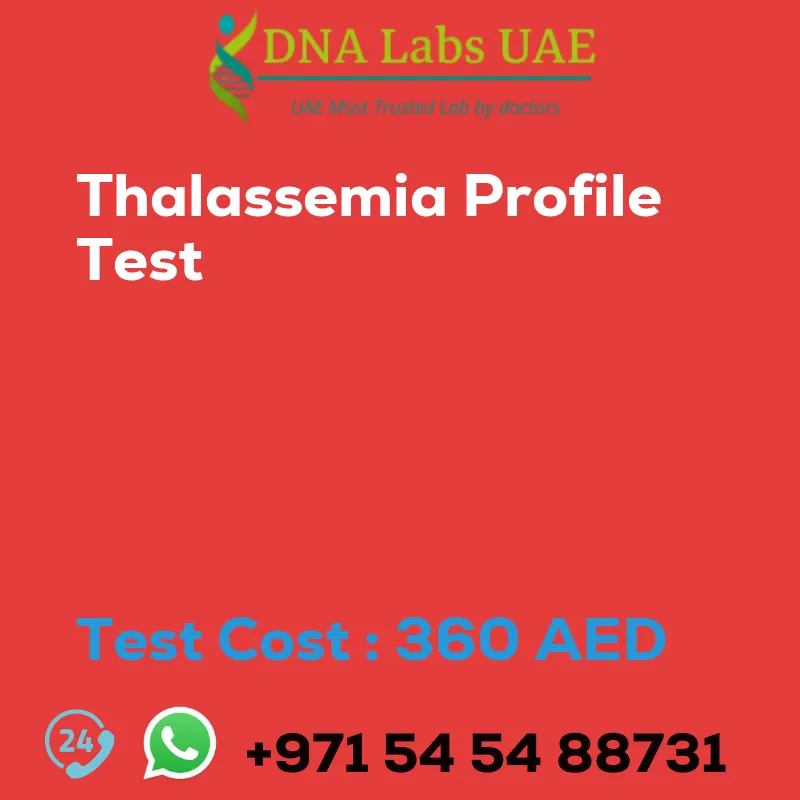THALASSEMIA PROFILE Test
The THALASSEMIA PROFILE test is a blood test that evaluates the presence and severity of thalassemia, a genetic blood disorder that affects the production of hemoglobin. Thalassemia is characterized by reduced or abnormal hemoglobin production, leading to anemia and other complications.
Test Components
- Iron Studies
- CBC (Complete Blood Count)
- Hemoglobin HPLC/Electrophoresis
Price
360.0 AED
Sample Condition
2 mL (1 mL min.) serum from 1 SST AND 5 mL (3.5 mL min.) whole blood from 2 Lavender Top (EDTA) tubes. Ship refrigerated. DO NOT FREEZE. Overnight fasting & sampling before 12 noon is preferred. Avoid iron supplements for minimum 24 hours prior to specimen collection.
Report Delivery
Sample Daily by 9am; Report Next day
Method
Spectrophotometry, Electrical Impedence, VCS & HPLC
Test Type
Anemia
Doctor
Hematologist
Test Department
Pre Test Information
Overnight fasting & sampling before 12 noon is preferred. Avoid iron supplements for minimum 24 hours prior to specimen collection.
Test Details
The THALASSEMIA PROFILE test is a blood test that evaluates the presence and severity of thalassemia, a genetic blood disorder that affects the production of hemoglobin. Thalassemia is characterized by reduced or abnormal hemoglobin production, leading to anemia and other complications. The THALASSEMIA PROFILE test typically includes the following components:
- Hemoglobin electrophoresis: This test separates and identifies different types of hemoglobin to determine if there are any abnormal variants present, such as hemoglobin S (associated with sickle cell disease) or hemoglobin E (associated with thalassemia).
- Complete blood count (CBC): This test measures the number of red blood cells, white blood cells, and platelets in the blood. In thalassemia, the red blood cell count is usually low, and the red blood cells may be smaller and paler than normal.
- Reticulocyte count: This test measures the number of young red blood cells (reticulocytes) in the blood. A low reticulocyte count indicates decreased red blood cell production, which is common in thalassemia.
- Iron studies: These tests evaluate the body’s iron levels, including serum iron, ferritin, and transferrin saturation. Thalassemia patients may have normal or high ferritin levels due to increased iron absorption caused by ineffective red blood cell production.
- Genetic testing: In some cases, genetic testing may be performed to identify specific mutations in the genes responsible for thalassemia. This can help determine the type and severity of thalassemia present.
The THALASSEMIA PROFILE test helps healthcare providers diagnose and monitor thalassemia, determine the type and severity of the condition, and guide appropriate treatment decisions. Treatment for thalassemia may include blood transfusions, iron chelation therapy, and stem cell transplantation.
| Test Name | THALASSEMIA PROFILE Test |
|---|---|
| Components | *IronStudies*CBC *Hemoglobin HPLC/Electrophoresis |
| Price | 360.0 AED |
| Sample Condition | 2 mL (1 mL min.) serum from 1 SST AND 5 mL (3.5 mL min.) whole blood from2LavenderTop(EDTA)tubes. Ship refrigerated. DO NOT FREEZE. Overnight fasting & sampling before 12 noon is preferred. Avoid iron supplements for minimum 24 hours prior to specimen collection. |
| Report Delivery | SampleDailyby9am;ReportNextday |
| Method | Spectrophotometry, Electrical Impedence, VCS & HPLC |
| Test type | Anemia |
| Doctor | Hematologist |
| Test Department: | |
| Pre Test Information | Overnight fasting & sampling before 12 noon is preferred. Avoid iron supplements for minimum 24 hours prior to specimen collection. |
| Test Details |
The THALASSEMIA PROFILE test is a blood test that evaluates the presence and severity of thalassemia, a genetic blood disorder that affects the production of hemoglobin. Thalassemia is characterized by reduced or abnormal hemoglobin production, leading to anemia and other complications. The THALASSEMIA PROFILE test typically includes the following components: 1. Hemoglobin electrophoresis: This test separates and identifies different types of hemoglobin to determine if there are any abnormal variants present, such as hemoglobin S (associated with sickle cell disease) or hemoglobin E (associated with thalassemia). 2. Complete blood count (CBC): This test measures the number of red blood cells, white blood cells, and platelets in the blood. In thalassemia, the red blood cell count is usually low, and the red blood cells may be smaller and paler than normal. 3. Reticulocyte count: This test measures the number of young red blood cells (reticulocytes) in the blood. A low reticulocyte count indicates decreased red blood cell production, which is common in thalassemia. 4. Iron studies: These tests evaluate the body’s iron levels, including serum iron, ferritin, and transferrin saturation. Thalassemia patients may have normal or high ferritin levels due to increased iron absorption caused by ineffective red blood cell production. 5. Genetic testing: In some cases, genetic testing may be performed to identify specific mutations in the genes responsible for thalassemia. This can help determine the type and severity of thalassemia present. The THALASSEMIA PROFILE test helps healthcare providers diagnose and monitor thalassemia, determine the type and severity of the condition, and guide appropriate treatment decisions. Treatment for thalassemia may include blood transfusions, iron chelation therapy, and stem cell transplantation. |






